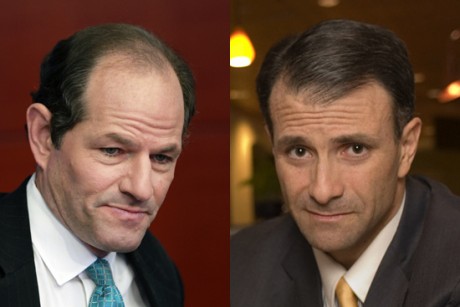Published on Monday, November 14, 2011 by Reuters / AP
Greek Coalition Partner Refuses to Back Austerity
Greece’s new prime minister is to present his policy platform ahead of a midweek confidence vote in parliament.
 Greece's new prime minister Lucas Papademos pictured at the Presidental Palace in Athens on November 11. (AFP Photo/Louisa Gouliamaki) Lucas Papademos, who is tasked with securing the country’s international loan lifeline, will meet finance minister Evangelos Venizelos today before this evening's presentation.
Greece's new prime minister Lucas Papademos pictured at the Presidental Palace in Athens on November 11. (AFP Photo/Louisa Gouliamaki) Lucas Papademos, who is tasked with securing the country’s international loan lifeline, will meet finance minister Evangelos Venizelos today before this evening's presentation.
Mr Papademos succeeds George Papandreou, whose proposal to hold a referendum on the country's bailout terms prompted EU leaders to raise the threat of a Greek exit from the euro zone.
The new Greek leader, a former central banker who oversaw his country's entry to the euro zone in 2002, must win a confidence vote in his cabinet before meeting euro zone finance ministers in Brussels on Thursday, state television reported, where he will be expected to outline next year's draft budget before putting it to parliament.
The interim coalition government is expected to easily win Wednesday’s confidence vote as it is backed by Greece’s two biggest parties and a small right-wing nationalist party.
However, the leader of Greece's main conservative group Antonis Samaras today his New Democracy party would not vote for any new austerity measures and said the mix of policies demanded by international lenders should be changed.
"We will not vote for any new measures," Mr Samaras told a meeting of his own MPs. He added that he would not sign any letter pledging a commitment to austerity measures, as has been demanded by EU economic and monetary affairs commissioner Olli Rehn, and that a verbal pledge should be sufficient.
Newspaper polls published yesterday showed Mr Papademos has the support of three in four Greeks. But he will face his first protest in front of parliament today afternoon from left-wing demonstrators who accuse the new government of working in the interests of bankers.
Inspectors from the International Monetary Fund, European Central Bank and European Union troika are due to start arriving in Athens today.
Greece depends on loans from a €110 billion rescue package in 2010. That bailout later proved inadequate, forcing a new €130 billion deal put together last month.
Release of a crucial €8 billion loan tranche this month - without which Greece will default on its debt mountain before Christmas - depends on approval of the new bailout.
Mr Rehn has said the EU and IMF will not release the tranche without written assurances from all Greek parties that they will back the measures, but New Democracy leader Antonis Samaras, who has given only tepid backing to the unity government, has said he will sign no pledge under external pressure.
 Greece's new prime minister Lucas Papademos pictured at the Presidental Palace in Athens on November 11. (AFP Photo/Louisa Gouliamaki) Lucas Papademos, who is tasked with securing the country’s international loan lifeline, will meet finance minister Evangelos Venizelos today before this evening's presentation.
Greece's new prime minister Lucas Papademos pictured at the Presidental Palace in Athens on November 11. (AFP Photo/Louisa Gouliamaki) Lucas Papademos, who is tasked with securing the country’s international loan lifeline, will meet finance minister Evangelos Venizelos today before this evening's presentation.Mr Papademos succeeds George Papandreou, whose proposal to hold a referendum on the country's bailout terms prompted EU leaders to raise the threat of a Greek exit from the euro zone.
The new Greek leader, a former central banker who oversaw his country's entry to the euro zone in 2002, must win a confidence vote in his cabinet before meeting euro zone finance ministers in Brussels on Thursday, state television reported, where he will be expected to outline next year's draft budget before putting it to parliament.
The interim coalition government is expected to easily win Wednesday’s confidence vote as it is backed by Greece’s two biggest parties and a small right-wing nationalist party.
However, the leader of Greece's main conservative group Antonis Samaras today his New Democracy party would not vote for any new austerity measures and said the mix of policies demanded by international lenders should be changed.
"We will not vote for any new measures," Mr Samaras told a meeting of his own MPs. He added that he would not sign any letter pledging a commitment to austerity measures, as has been demanded by EU economic and monetary affairs commissioner Olli Rehn, and that a verbal pledge should be sufficient.
Newspaper polls published yesterday showed Mr Papademos has the support of three in four Greeks. But he will face his first protest in front of parliament today afternoon from left-wing demonstrators who accuse the new government of working in the interests of bankers.
Inspectors from the International Monetary Fund, European Central Bank and European Union troika are due to start arriving in Athens today.
Greece depends on loans from a €110 billion rescue package in 2010. That bailout later proved inadequate, forcing a new €130 billion deal put together last month.
Release of a crucial €8 billion loan tranche this month - without which Greece will default on its debt mountain before Christmas - depends on approval of the new bailout.
Mr Rehn has said the EU and IMF will not release the tranche without written assurances from all Greek parties that they will back the measures, but New Democracy leader Antonis Samaras, who has given only tepid backing to the unity government, has said he will sign no pledge under external pressure.
© 2011 Irish Times










